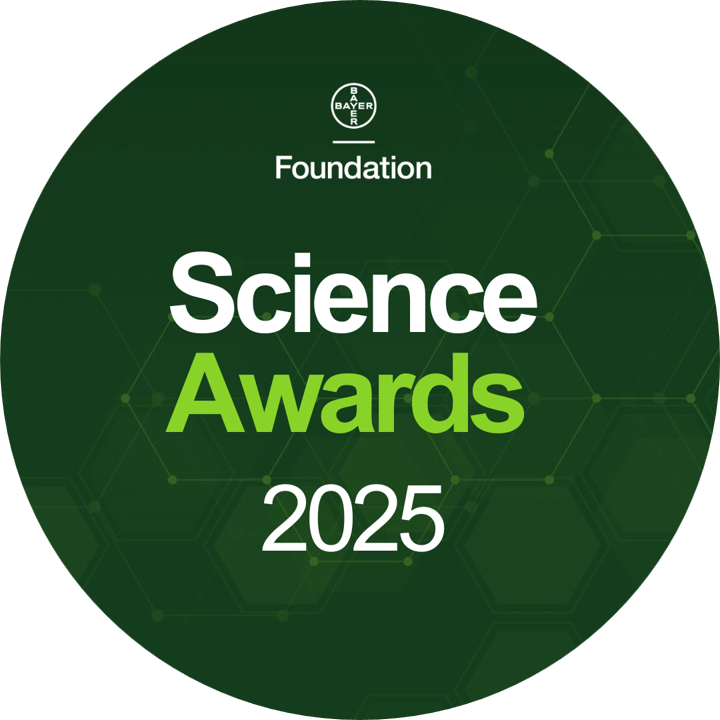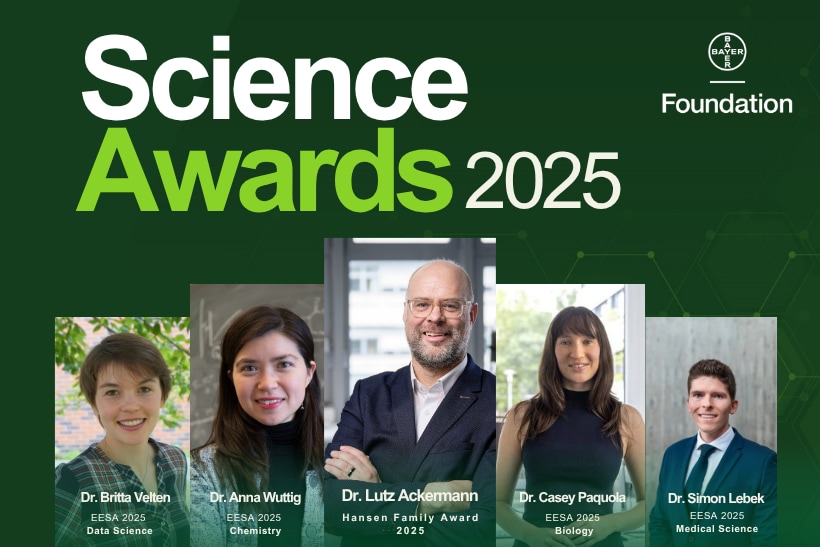Research Awarded: Our Science Awards 2025 honor five outstanding scientists

Chemist Prof. Dr. Lutz Ackermann from the Georg-August University Göttingen is awarded the €75,000 Hansen Family Award from the Bayer Foundation this year. The prize honors Ackermann's research in sustainable chemistry, organic synthesis, and catalysis. Additionally, Dr. Casey Paquola, Dr. Simon Lebek, Dr. Anna Wuttig, and Dr. Britta Velten receive the “Early Excellence in Science Award” as emerging talents in Life Sciences.

Portrait Lutz Ackermann, Copy Right: Werner Siemens Stiftung/ Felix Wey
The Hansen Family Award is awarded every two years by the corporate foundation Bayer Foundation. The prize was created thanks to generous donations from the estate of Kurt Hansen, the former chairman of Bayer’s Supervisory Board. To date, 13 researchers have received the prize, including Emmanuelle Charpentier, Nobel laureate and scientist in the field of genome editing. The “Early Excellence in Science Award”, established in 2009, has since honored 47 young talents in the Life Sciences. It includes a prize money of €10,000 for each recipient.
Ackermann develops reaction techniques for improving medications
For 20 years, Lutz Ackermann has been developing and refining molecular research. Carbon-hydrogen compounds play a key role in this. The bond between carbon and hydrogen forms the backbone of organic molecules. These bonds are so strong that they can hardly be broken in a targeted and precise way. However, if successful, a new functional group can be attached to this point. In this way, the structure of a molecule can be precisely and specifically changed — and with it, its properties, such as solubility or degradation in the body. This allows new active ingredients to be developed and tested faster. “It's somewhat like playing with Lego,” explains Ackermann, professor at the Georg-August University Göttingen. “We take a molecule — our Lego construction — and swap out a piece at a certain point. This allows us to change the molecule and even create structures that didn't exist before.”
The reaction techniques developed by Ackermann, known as C-H activations, are widely applicable. "The only requirement to use this technique is that a molecule has a carbon-hydrogen bond. Complex anti-cancer agents or therapeutic proteins can be specifically modified and thus efficiently improved at the desired location. While conventional syntheses often require ten to fifteen steps, the change with C-H activation succeeds in just one step — saving time and resources such as solvents and producing less waste."
As of now, no drug modified using this method has reached the market yet. However, together with other researchers in various scientific fields, Ackermann is advancing the application, for example, to improve efficiency in the development of new cancer drugs. At the same time, Ackermann aims to make chemical processes more sustainable. He and his team are researching catalysts that are necessary to make complicated modifications to molecules.

“The Hansen Family Award is conferred in recognition of exceptional scientific contributions that hold the potential to catalyze breakthrough innovations in medicine and allied disciplines. Professor Lutz Ackermann’s pioneering research serves as the basis to significantly advance the development of novel cancer therapies, offering hope to millions of patients worldwide.”
Chitkala Kalidas, Executive Director Bayer Foundation
Four emerging talents receive “Early Excellence in Science Award”
Alongside the Hansen Family Award, the Bayer Foundation also awards the “Early Excellence in Science Award” in the categories of biology, chemistry, medicine, and data science. This award recognizes the inspiring work of young researchers who are pioneering in their fields. Casey Paquola from the Jülich Research Center receives the prize in biology for her research on simulating human brain maturation, which can help identify abnormalities in brain development earlier. Simon Lebek, working at the University Hospital Regensburg, is awarded in the category of medicine for his work on gene-editing technologies for the treatment of cardiovascular diseases. Chemist Anna Wuttig at the University of Chicago receives the award for advancing electrocatalysis for energy storage, conversion, and medicinal chemistry. Britta Velten from the University of Heidelberg impressed the independent jury of the Bayer Foundation with her research in machine learning and data sciences to enable new insights into health and disease.
All awardees will be recognized in an award ceremony in February 2026 held in Leverkusen. An overview of all previous award recipients of the Bayer Foundation Science Awards can be found here on our website.



